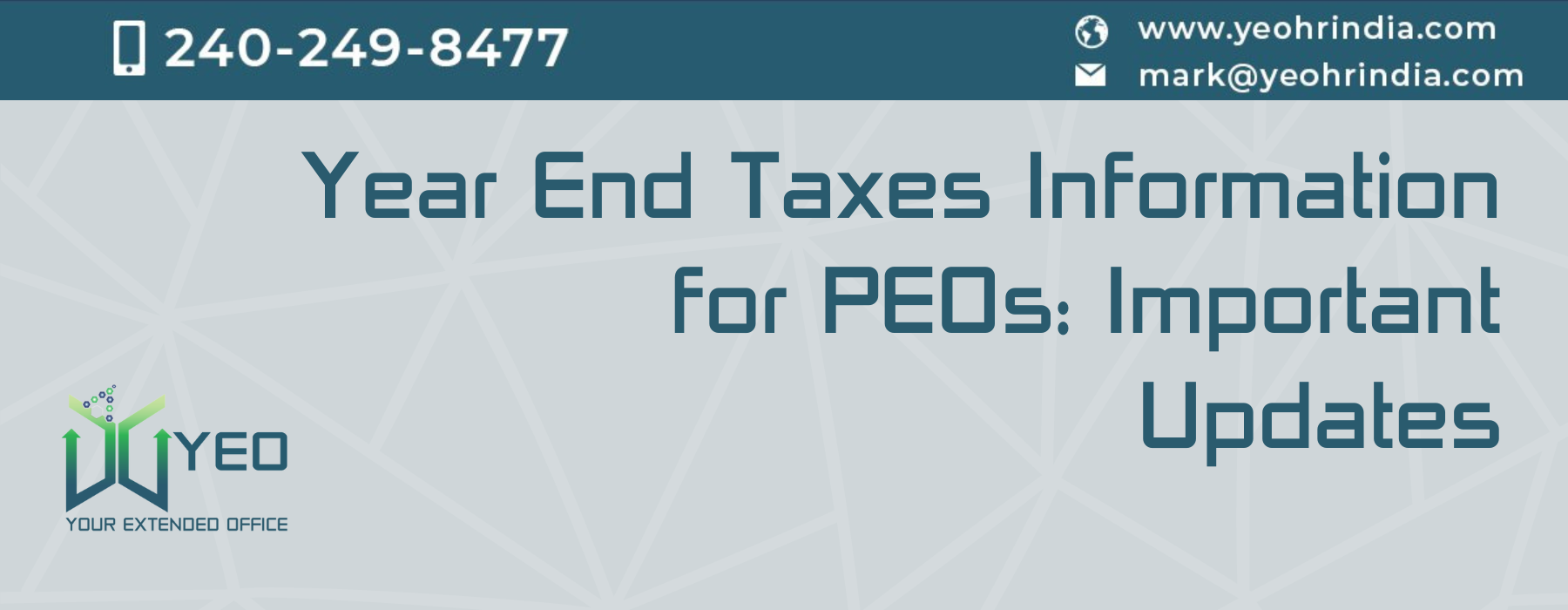 As the year comes to a close, PEOs (Professional Employer Organizations) must prioritize year-end tax preparations. Navigating the complex landscape of federal, state, and local tax regulations is critical to ensuring compliance and avoiding penalties. With ongoing changes in tax laws and filing requirements, staying informed is crucial for PEOs to successfully manage their clients’ tax obligations. This blog covers the latest updates on federal and state tax laws, key filing requirements, and how PEOs can streamline year-end payroll processes.
As the year comes to a close, PEOs (Professional Employer Organizations) must prioritize year-end tax preparations. Navigating the complex landscape of federal, state, and local tax regulations is critical to ensuring compliance and avoiding penalties. With ongoing changes in tax laws and filing requirements, staying informed is crucial for PEOs to successfully manage their clients’ tax obligations. This blog covers the latest updates on federal and state tax laws, key filing requirements, and how PEOs can streamline year-end payroll processes.
As the year comes to a close, PEOs (Professional Employer Organizations) must prioritize year-end tax preparations. Navigating the complex landscape of federal, state, and local tax regulations is critical to ensuring compliance and avoiding penalties. With ongoing changes in tax laws and filing requirements, staying informed is crucial for PEOs to successfully manage their clients’ tax obligations. This blog covers the latest updates on federal and state tax laws, key filing requirements, and how PEOs can streamline year-end payroll processes.
Tax Filing Requirements for PEOs
PEOs must adhere to stringent tax filing obligations at both the federal and state levels. At the federal level, the most notable requirements include filing IRS Form 941 (Employer’s Quarterly Federal Tax Return) and adhering to the Federal Unemployment Tax Act (FUTA) filings. These forms are crucial for ensuring that employer-level taxes, such as Social Security and Medicare, are accurately reported for each quarter of the year.
Additionally, PEOs must manage and report taxes on behalf of their clients, which means keeping track of employment taxes, income tax withholdings, and unemployment insurance contributions for multiple entities. Staying organized and using integrated HR systems can help streamline these processes and reduce the risk of errors or missed deadlines.
Updates on Federal and State Tax Laws
Recent changes in federal tax laws may impact how PEOs manage their clients’ payroll taxes. For example, updates to the Social Security wage base for 2024 have increased the cap for taxable earnings, which affects payroll tax calculations. Additionally, changes to FUTA tax rates may require PEOs to adjust their tax planning strategies.
At the state level, many states have introduced changes to unemployment insurance (UI) tax rates and reporting requirements. PEOs operating across multiple states must be aware of any region-specific updates to ensure compliance. For instance, several states have adjusted their State Unemployment Insurance (SUI) wage base for 2024, impacting payroll deductions.
Make Year-End Tax Filing Easy for Your PEO. Learn More
W2 Preparation and Distribution
A critical component of year-end tax responsibilities for PEOs is ensuring the accurate preparation and timely distribution of W2 forms to employees. Since PEOs manage payroll for their clients, they are responsible for reporting employee earnings, taxes withheld, and benefits provided throughout the year.
Leveraging digital tools can streamline the W2 generation process, ensuring accuracy and efficiency. PEOs should implement payroll software that integrates tax filing capabilities to reduce errors, allowing for seamless submission and delivery of W2 forms to employees. Additionally, it’s essential to ensure that any discrepancies or updates to employee data are addressed before W2 forms are finalized.
Tax Credits and Deductions for PEOs
PEOs can leverage various tax credits and deductions to reduce their overall tax burden while providing valuable savings to their clients. One of the most significant credits in recent years has been the Employee Retention Credit (ERC), designed to support businesses retaining employees during challenging economic conditions, such as the COVID-19 pandemic. Although the ERC program has expired for 2024, PEOs should still evaluate their clients’ eligibility for past credits and ensure those credits are properly reflected in tax filings.
Another key area for PEOs to explore is the Work Opportunity Tax Credit (WOTC), which incentivizes hiring individuals from specific target groups, such as veterans, long-term unemployed individuals, or individuals receiving government assistance. PEOs can work with their clients to identify qualifying employees and apply for the WOTC, which reduces the amount of federal tax owed.
PEOs should also explore other deductions that may apply, such as those related to healthcare coverage, retirement plan contributions, and business expenses associated with managing HR, payroll, and compliance services for clients. Keeping up with changes in tax legislation that impact deductions can lead to significant tax savings for both PEOs and their clients.
 Avoiding Common Tax Pitfalls
Avoiding Common Tax Pitfalls
Navigating tax filings for multiple clients can be complex, and even minor errors can lead to costly penalties or audits. One of the most common pitfalls PEOs face is the misclassification of employees and independent contractors. Incorrect classification can lead to inaccurate tax reporting, resulting in fines from the IRS or state agencies. To avoid this, PEOs should have a robust system in place to correctly classify workers based on federal and state guidelines.
Another common issue is failing to meet filing deadlines. With the large volume of forms that PEOs must file for their clients—such as quarterly 941 forms, unemployment tax filings, and W2s—it’s easy to miss a deadline, especially when managing compliance across multiple states. Implementing an automated payroll system with reminders and alerts for approaching deadlines can significantly reduce the risk of late filings and associated penalties.
Lastly, failing to keep up with ever-changing tax regulations can also result in compliance issues. PEOs must invest in ongoing education and regularly consult with tax experts to stay updated on both federal and state tax laws. Attending webinars, subscribing to industry newsletters, or working with tax advisory firms are great ways to stay informed.
Conclusion
The end of the year is a critical time for PEOs to ensure they are fully compliant with tax regulations and prepared for upcoming changes in the tax landscape. By staying informed on federal and state tax updates, leveraging available tax credits, and avoiding common pitfalls, PEOs can streamline their tax processes and provide added value to their clients. YEO HR India’s specialized tax support services can help PEOs navigate these complexities, ensuring a smooth and efficient year-end closeout. Reach out to YEO HR India today to learn more about how we can assist your PEO with year-end tax compliance and preparation.







